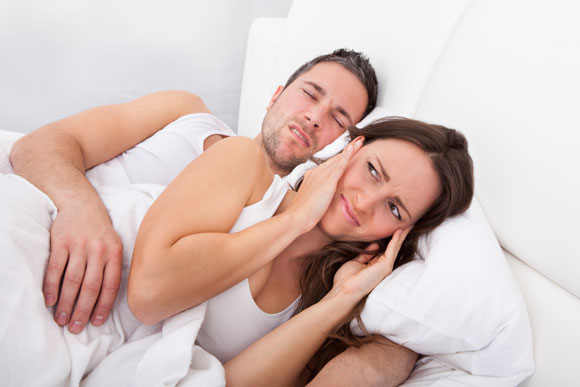Do You Know If You Snore?

Posted on September 11, 2014

 I don’t think I do but my husband tells me I snore when my allergies are acting up (I don’t believe him!!!) Snoring is noisy breathing during sleep. Persons most at risk are males and those who are overweight, but snoring is a common problem of both genders. Snoring usually becomes more serious as people age. It can cause disruptions to your own sleep and your bed-partner’s sleep. The two most common adverse health effects that are believed to be casually linked to snoring are daytime dysfunction and heart disease .
I don’t think I do but my husband tells me I snore when my allergies are acting up (I don’t believe him!!!) Snoring is noisy breathing during sleep. Persons most at risk are males and those who are overweight, but snoring is a common problem of both genders. Snoring usually becomes more serious as people age. It can cause disruptions to your own sleep and your bed-partner’s sleep. The two most common adverse health effects that are believed to be casually linked to snoring are daytime dysfunction and heart disease .
Snoring may be more than just an annoying habit – it may be a sign of sleep apnea. About one-half of people who snore loudly have obstructive sleep apnea. People with sleep apnea characteristically make periodic gasping or “snorting” noises, during which their sleep is momentarily interrupted. Those with sleep apnea may also experience excessive daytime sleepiness, as their sleep is frequently disrupted. This means the brain and the rest of the body may not get enough oxygen.
If left untreated, sleep apnea can result in a growing number of health problems, including: high blood pressure, stroke, heart failure, diabetes, and depression.
What are the symptoms of sleep apnea?
People who snore make a vibrating, rattling, noisy sound while breathing during sleep. It may be a symptom of sleep apnea. Consult your doctor if you snore and have any of the following symptoms or signs:
- Excessive daytime sleepiness
- Morning headaches
- Awakening in the morning not feeling rested
- Awaking at night feeling confused
- Change in your level of attention, concentration, or memory
- Observed pauses in breathing during sleep
As interruption of regular breathing or obstruction of the airway during sleep can pose serious health complications, symptoms of sleep apnea should be taken seriously. There are simple treatments for mild sleep apnea, including:
- Losing weight.
- Avoiding alcohol and sleeping pills.
- Changing sleep positions to improve breathing.
- Stopping smoking.
- Avoiding sleeping on your back.
Other treatments include using a CPAP (continuous positive airway pressure) device, surgery, and specially made dental devices. Treatment should be sought from your health care provider.
Don’t forget to take  my weekly quiz and get your free reward!
my weekly quiz and get your free reward!
I call this my Dr. Laurie mini-(yet very useful) first aid kit. It’s a pretty handy thing to have on hand. But, hurry before they are all gone!

Please read our Disclaimer.
Comments are currently closed.








